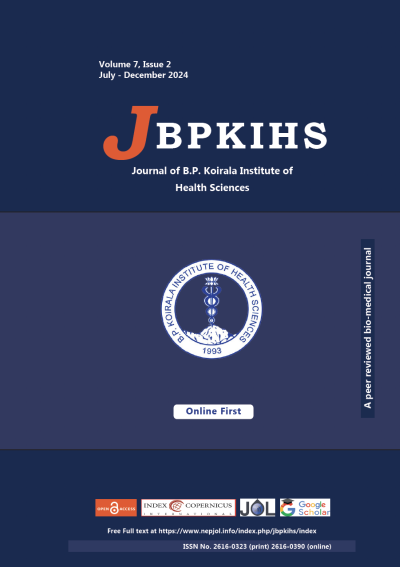Assessment of Post-Procedure Complications Following Chest Tube Drainage in Pleural Effusion Patients: An Observational Retrospective Study
DOI:
https://doi.org/10.3126/jbpkihs.v7i2.68882Keywords:
Chest tube drainage, Patient outcomes, Pleural effusion, Post- procedure complicationsAbstract
Background: Pleural effusion is common in routine medical practice due to various underlying diseases. Chest tube drainage is a common therapeutic intervention for managing pleural effusion. Despite being an effective procedure, it carries the risk of multiple complications, which can significantly impact patient outcomes. This study aims to determine the incidence and different types of post-procedure complications following chest tube drainage in patients with pleural effusion.
Methods: We conducted an observational retrospective study at the department of Pulmonary, Critical Care and Sleep Medicine at B P Koirala Institute of Health Sciences, reviewing medical records of patients who underwent chest tube drainage for pleural effusion fulfilling the inclusion criteria from June 1, 2023, to May 31, 2024. Data collected included patient baseline characteristics, clinical symptoms, procedural details, and post-procedure outcomes. The primary outcome measures were the incidence and types of complications after chest tube drainage in patients with pleural effusion.
Results: A total of 55 patients were included in the study; a majority of patients 65.5%, were male and of total patients 61.8% were smoker. The most common clinical presentation were shortness of breath 74%, cough 72.7% and chest pain 43.6%. The common complications observed were pain 27.2%, tube blockage 10.9%, subcutaneous emphysema 10.9%, site infection 5.45%, bleeding 3.6% and pneumothorax 3.6%.
Conclusion: Chest tube drainage for the management of pleural effusion is associated with a significant risk of immediate and delayed complications. Understanding the frequency and types of these complications can inform clinical practice and improve patient outcomes.
Downloads
Downloads
Published
How to Cite
Issue
Section
License
Copyright (c) 2024 Journal of BP Koirala Institute of Health Sciences

This work is licensed under a Creative Commons Attribution-NonCommercial-NoDerivatives 4.0 International License.
This license enables reusers to copy and distribute the material in any medium or format in unadapted form only, for noncommercial purposes only, and only so long as attribution is given to the creator.




